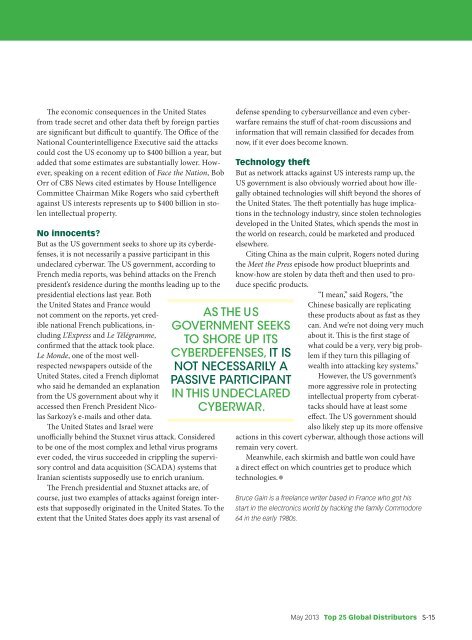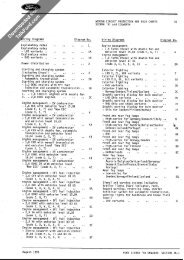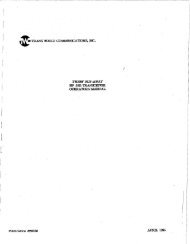201305.pdf 43279KB May 08 2013 11:07:04 PM
201305.pdf 43279KB May 08 2013 11:07:04 PM
201305.pdf 43279KB May 08 2013 11:07:04 PM
Create successful ePaper yourself
Turn your PDF publications into a flip-book with our unique Google optimized e-Paper software.
The economic consequences in the United Statesfrom trade secret and other data theft by foreign partiesare significant but difficult to quantify. The Office of theNational Counterintelligence Executive said the attackscould cost the US economy up to $400 billion a year, butadded that some estimates are substantially lower. However,speaking on a recent edition of Face the Nation, BobOrr of CBS News cited estimates by House IntelligenceCommittee Chairman Mike Rogers who said cybertheftagainst US interests represents up to $400 billion in stolenintellectual property.No innocents?But as the US government seeks to shore up its cyberdefenses,it is not necessarily a passive participant in thisundeclared cyberwar. The US government, according toFrench media reports, was behind attacks on the Frenchpresident’s residence during the months leading up to thepresidential elections last year. Boththe United States and France wouldnot comment on the reports, yet crediblenational French publications, includingL’Express and Le Télégramme,confirmed that the attack took place.Le Monde, one of the most wellrespectednewspapers outside of theUnited States, cited a French diplomatwho said he demanded an explanationfrom the US government about why itaccessed then French President NicolasSarkozy’s e-mails and other data.The United States and Israel wereunofficially behind the Stuxnet virus attack. Consideredto be one of the most complex and lethal virus programsever coded, the virus succeeded in crippling the supervisorycontrol and data acquisition (SCADA) systems thatIranian scientists supposedly use to enrich uranium.The French presidential and Stuxnet attacks are, ofcourse, just two examples of attacks against foreign intereststhat supposedly originated in the United States. To theextent that the United States does apply its vast arsenal ofAs the usgovernment seeksto shore up itscyberdefenses, it isnot necessArily ApAssive pArticipAntin this undeclAredcyberwAr.defense spending to cybersurveillance and even cyberwarfareremains the stuff of chat-room discussions andinformation that will remain classified for decades fromnow, if it ever does become known.Technology theftBut as network attacks against US interests ramp up, theUS government is also obviously worried about how illegallyobtained technologies will shift beyond the shores ofthe United States. The theft potentially has huge implicationsin the technology industry, since stolen technologiesdeveloped in the United States, which spends the most inthe world on research, could be marketed and producedelsewhere.Citing China as the main culprit, Rogers noted duringthe Meet the Press episode how product blueprints andknow-how are stolen by data theft and then used to producespecific products.“I mean,” said Rogers, “theChinese basically are replicatingthese products about as fast as theycan. And we’re not doing very muchabout it. This is the first stage ofwhat could be a very, very big problemif they turn this pillaging ofwealth into attacking key systems.”However, the US government’smore aggressive role in protectingintellectual property from cyberattacksshould have at least someeffect. The US government shouldalso likely step up its more offensiveactions in this covert cyberwar, although those actions willremain very covert.Meanwhile, each skirmish and battle won could havea direct effect on which countries get to produce whichtechnologies.•Bruce Gain is a freelance writer based in France who got hisstart in the electronics world by hacking the family Commodore64 in the early 1980s.<strong>May</strong> <strong>2013</strong> Top 25 Global Distributors S-15






![[270].pdf 37407KB Sep 02 2010 09:55:57 AM - ElectronicsAndBooks](https://img.yumpu.com/50350834/1/185x260/270pdf-37407kb-sep-02-2010-095557-am-electronicsandbooks.jpg?quality=85)
![draaien, A Viruly 1935 OCR c20130324 [320]. - ElectronicsAndBooks](https://img.yumpu.com/49957773/1/190x252/draaien-a-viruly-1935-ocr-c20130324-320-electronicsandbooks.jpg?quality=85)



![20051110 c20051031 [105].pdf 35001KB Feb 18 2009 08:46:32 PM](https://img.yumpu.com/48687202/1/190x253/20051110-c20051031-105pdf-35001kb-feb-18-2009-084632-pm.jpg?quality=85)




